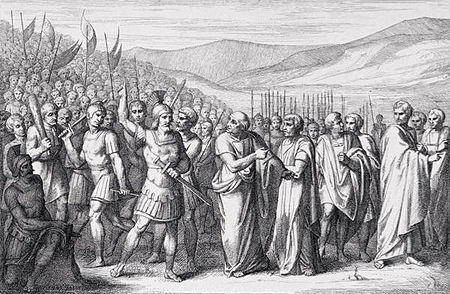It is increasingly likely that labor unrest will be one of the biggest issues, if not the biggest, of this decade.
It makes me think of the secessio plebis in ancient Rome.
Although it is usually forgotten, ancient Rome started out as a republic. (It is also forgotten that the Roman Republic was the model for the U.S. Constitution. Just one example: what was the name of the legislative body in ancient Rome? The Senate.)
The Roman Republic lasted from (about) 509 BC to 27 BC, the date that is usually given for the founding of the Empire.
Anyone who reads a history of those 500 years realizes how stormy they were. The populace was divided into the patricians, the small ruling class, and the plebes, who were everyone else (the source of our word “plebeian”).

The patricians did most of the ruling, at least at first. Over the centuries, the plebes gained more rights, but they had to fight bitterly for each one. Sometimes this involved a massive general strike: the secessio plebis, or the “withdrawal of the plebes.”
When the plebes got fed up enough, they simply stopped work. Since they were doing all the work to begin with, things ground to a halt. Usually, the patricians had to give way. This happened five times in the history of the republic.
Commenting on this situation, the great political philosopher Niccolò Machiavelli wrote, “In every republic there are two opposed factions, that of the people and that of the rich, and . . . all the laws made in favor of liberty result from their discord.”
This sums up a great deal of the current political situation. You could see the Great Resignation as a kind of secessio plebis. Labor upheavals show every likelihood of continuing for years, even into the next decade. They will cause many dislocations, even the restructuring of political boundaries and affiliations, as is already happening.
Machiavelli understood that this is an inevitable part of the process, although of course it is not a pleasant one.
This trend is certainly affecting the produce industry, as it is all others.
What put me in mind of all this? The increasing frustration of truckers with their pay and working conditions.
It is simplistic to think that this is all the fault of the coronavirus, but such was not the case. The coronavirus merely brought matters to a head.
Currently truck drivers are agitating against long waiting hours at ports. A shortage of cranes and crane operators is causing huge wait times. Because most truckers are independent contractors, they are not paid by the hour, but by the job. A twelve-hour wait takes a heavy toll physically, emotionally, and financially. (See here).
It also seems fairly clear that the produce industry is not exactly at the top of heap as far as supply chain priorities are concerned.
Addressing this issue in a speech at the Port of Savannah, Pete Buttigieg, U.S. secretary of transportation, said, “In too many environments, from warehouses to ports, there is no cost to wasting a trucker’s time. We’ve got to fix that.”
There is a movement afoot, led by Truckers Movement for Justice, to have truck drivers paid for all hours worked. Their motto: “All hours worked, all hours paid”).
You could view this situation from many angles. Probably the most objective one is to see it, as Machiavelli did, as a struggle between counterweighing forces. For decades, management had the upper hand and, following the Gospel of Milton Friedman, could turn profits over to shareholders instead of increasing employees’ wages. Now these positions are reversing themselves.
Is this a Good Thing or a Bad Thing? Your answer will depend almost entirely on your own role in the American economy.



